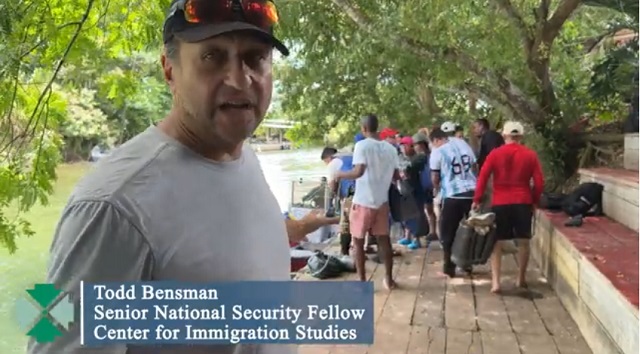(0:10) You are seeing the most well-oiled industrialized human smuggling assembly line machine anywhere on the planet. It roars all day and night far beyond American awareness, in and all around this far northwest Colombia village named Capurgana.
(0:34) As far away as it is, this people-moving machine in far northwestern Colombia matters to the American public because it has mainlined nearly two million foreign nationals, like these, the last few years into American cities. But, also ones like these, including hundreds on the US terrorism watch list and criminal aliens among total strangers from 150 nations, like China.
Boatload by boatload. Across the Gulf of Uraba and into the famous Darien Gap migration chokepoint to Panama, and on to the US southern border.
(1:20) They arrive on buses and taxis in towns on one side of the Gulf, and then boat across to towns on the other side and head into the Darien Gap. A flow that carries suspected terrorists, like these Afghans Panama recently discovered and pulled off the trails on its side, or like this Somali terrorist a few years ago, and Chinese nationals and strangers from every nation adversarial to the United States.
(1:49) At issue is that none of this should be happening right now on the Gap’s Colombia side. But the machine is running just as strong today as it was before a new regional deal where Panama and Colombia are supposed to close the Darien Gap for the first time ever.
(2:10) On July 1, 2024, the new president of Panama, José Raúl Mulino, with the supposed essential backing of the Biden-Harris White House and Colombia, launched an unprecedented new policy to choke off the Darien Gap, which, with any actual follow-through, would dramatically improve U.S. national and border security.
The plan relied heavily on Colombia’s partnership and a signed American agreement on July 1 to support that closure plan financially and diplomatically.
But, the Center for Immigration Studies went to Colombia to gauge how it was all working out and found, instead of closure on the Colombia side, a stunning reality.
(2:54) A tight-knit partnership between a paramilitary organization called the Gaitanist Self-Defense Force of Colombia – also known as the Clan del Golfo – that with an iron fist rules all that goes on in this region, and the Colombian government, banks, the United Nations, and a wide range of non-governmental migration advocacy groups.
Together, the legitimate and illegitimate run a vast, well-oiled human smuggling machine that pumps humanity to the American border, unimpeded, profitably – and wittingly – for all involved.
(3:34) It all starts with the Gaitanistas, the Clan del Golfo – so named for its control of the Uraba Gulf’s smuggling lanes to the Panamanian border and dozens of towns and villages that line the Gulf of Uraba.
In 2023, top U.S. law enforcement officials, announcing the extradition of a top Clan leader to New York State, described the paramilitary group as the most violent and powerful criminal organization in all of Colombia:
“…To commit brutal acts of violence, terror, and retaliation…to exert control over vast territorial regions of Colombia and its people…The CDC used military tactics and weapons to control the most lucrative cocaine trafficking region within Colombia…Its paramilitary organization’s thousands of soldiers, including sicarios or hitmen as they’re called, murdered, assaulted, kidnapped, tortured, and assassinated….”
(4:41) In Panama recently, the director general of the country’s National Border Service (SENAFRONT) explained to the Center that a major diplomatic push was underway to get Colombia on board with its Darien Gap closure plan, which includes going after the Gaitanista Gulf Clan.
Two months into the Panama shutdown plan, no impact was evident on the Colombia side. In fact, quite the opposite.
(5:08) The Center for Immigration Studies went to look and found the Gulf Clan so proud of its humming machine that it granted access to a clandestine boat dock and one of two camps in Acandi.
“This is a primary staging area for people that are heading into the Darien Gap into Panama. This is the dock, and behind me, you’re seeing immigrants that are actually loading right now as we speak on their way to the trailheads. The trailheads are probably still a good 20 or 30 miles from here. There is a process in place – a very organized process – because so many hundreds of thousands of people have come through here over the past few years to take advantage of Joe Biden’s policy of creating a super highway out of the Darien Gap. Very organized activity. You’ve got their equipment for traveling into the Gap, which has already arrived by an earlier boat. They’ll be matched with their tickets and… Okay, another boat has just come in.
“Just a non-stop assembly line. Very well organized. The town assembly has organized a conveyor belt assembly line, labor force. There’s also police who are overseeing this operation. We’re seeing welcome signs and migrant camps. Very well-oiled.”
(7:03) The Center found marital bliss between the Clan, the Colombian government, and even banks.
(7:20) With permitted access in Acandi, the Center toured a Gulf Clan-controlled migrant camp, though no filming was allowed inside. Operatives control access on the perimeter. So, who was allowed inside?
Colombian banks and Western Union providing money wiring services, nonprofit groups providing food, medicine, and all manner of assistance to immigrants arriving and departing for obvious trips into the nearby Darien Gap.
(8:07) At the Clan-controlled ferry boat docks in Necoclí and Turbo, where migrants board, Colombian federal migration officers check papers and let obvious immigrants board Clan-controlled ferries over to staging areas.
Municipal officials charge a toll tax on each and every migrant before they can board. All worked openly together for the common interest aim of moving mass volumes of totally obvious migrants that everyone involved well knows will illegally breach the next six nations and then the American border.
(8:58) In and around the UN and NGOs, Gulf cartel operatives charge immigrants as much as $300 per head cash for permission to buy a ferry ticket and cross the Gulf … then hundreds more for a guide once they arrive in towns like Capurganá and Acandi.
They tried to charge even me as my taxi entered the ferry boat terminal in Turbo, stopping the taxi, but then looking in through the window and determining that I was no immigrant and letting us through.
(9:51) Much in the way of U.S. national and homeland security is riding on Panama’s plan to close the Darien Gap. The Biden/Harris White House was supposed to help Panama pressure its ally Colombia to shut this down. Promised American money for deportation flights out of Panama hasn’t showed up, forcing Panama to keep its side of the border open still.
(10:15) But the Clan del Golfo, the United Nations, migrant help groups, the Colombian government – and thousands upon thousands of illegal immigrants who will all end up living in America – are still on the machine.
All for one and one for all here in northwestern Colombia.
I’m Todd Bensman, Center for Immigration Studies in Colombia.
















